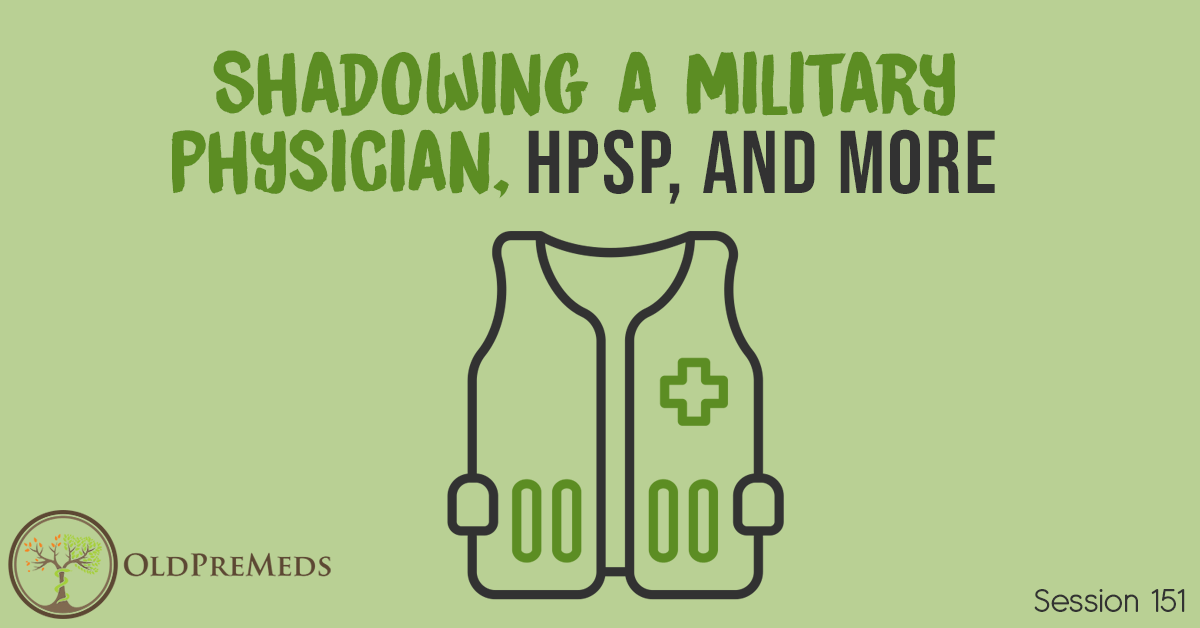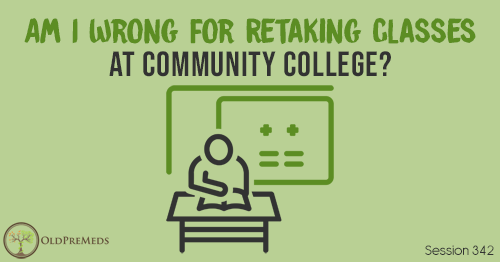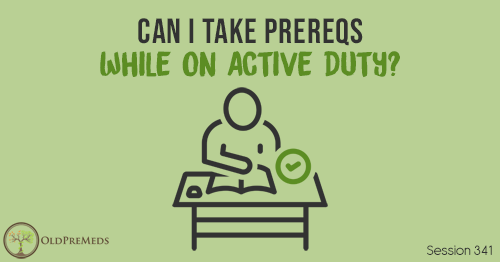Apple Podcasts | Google Podcasts

Session 151
Our student today is interested in HPSP or Public Health Services but wants to know what a day in the life of a military doc is like. We answer her questions.
Your questions answered here are taken from the Nontrad Premed Forum. If you don’t have an account yet, sign up for free! Join an amazing community of nontrad students. This podcast is part of the MedEd Media Network. Be sure to check out all our other podcasts as you try to move along this journey towards becoming a physician.
[01:05] OldPreMeds Question of the Week:
“I am a non-trad, with a couple years of experience as an assistive technology entrepreneur and hospital project manager. I started a post-bac pre-med program this year and on a track to take the MCATs and apply in 2020. I have been doing more research on medical schools, trying to balance pre-requisites and work. Listening to Dr. Grey’s podcasts I have learned a lot about how to prepare for medical school and after. This podcast has brought me both a lot of peace of mind as I listen to it on my commute to class and to work. With that being said there are a few areas I have specific questions.
HPSP – I most recently learned about the Military Medicine program through the podcasts and am highly considering it. A few reasons this interests me: (a) I would love to give back through the medical work that I do, one of my interests as a designer was low-cost prosthetics and other medical devices, (b) different/lack of insurance regulations (c) opportunities to participate in medical research with the DOD and foreign governments.
I am trying to shadow at the local Navy hospital and my pre-med advisor is helping get me in contact with a recruiter. Does anyone have suggestions as to how I can learn what the day-in-the-life of a military doctor is like? What is the work-life balance like or the possibility of having a family (I am a woman and would one day want kids – I’ll be in my 30’s when I finish residency)?
Are there more opportunities to get involved with research?
What are the possibilities of getting into pediatrics or a peds specialty (like pediatric neurology) offered through military residencies? I know my interests might change in med school but from the shadowing I have done, something with peds or adolescents is interesting to me and I don’t want to close that door.
USPHS – How is this different from HPSP and what are the requirements, processes involved? Is this only for primary care?
Clinical Experience – Are there clinical experience (paid, because I need to put food on the table) opportunities as a pre-med that might be able to give me more insight to military medicine or public health service?”
[03:25] What is HPSP?
HPSP stands for the Health Professions Scholarship Program. It’s the program I used to go through medical school. When I got my acceptance, I went to the Air Force and signed up for scholarship and was awarded. Then I bid my time afterward.
I’m a huge advocate and evangelist for HPSP as long as you know what the risks and benefits are. One of the risks is that you are owned by the military and they may not want you to do the specialty that you want to do. They’re never going to force you to do a specialty outside of what you want to do, but they’ll tell maybe tell you no to the specialty you want to do. In that case, you’ll have to be a general medical officer. You’ll do your internship year and be a brigade surgeon, flight surgeon, a GMO family practice doctor, or whatever that may be depending on the branch you are involved in.
On the other hand, one huge benefit of HPSP is that you won’t have any debt. The average debt is $170,000 and to come out of it without any debt is great! But you shouldn’t want to do it for the money.
[Tweet “”HPSP has a lot of risks. It has obviously a lot of upsides. You graduate medical school with basically no debt.” https://medicalschoolhq.net/opm-151-shadowing-a-military-physician-hpsp-and-more/”]
[04:55] How to Do Shadowing in the Military
Shadowing in the military is going to be a lot harder. Not only are you dealing with HIPAA but also the military. So being involved and getting on base, getting clearances to be on base and be in a clinic is going to be a lot harder than a normal shadowing experience with a civilian physician.
The best thing to get involved is to reach out to different clinics in your area. Try to find a physician who’s willing to talk to you after hours when they’re not in the hospital or clinic and learn from them what life is like.
[Tweet “”It’s going to be pretty hard to shadow in a military setting. The military is very protective of their bases and people who have access to their bases rightfully so.” https://medicalschoolhq.net/opm-151-shadowing-a-military-physician-hpsp-and-more/”]
[06:00] A Day in the LIfe of a Military Doctor
Basically, it’s the same as any other physician. You’re there as a physician and that’s your job day in and out. Your job is to go and treat patients. That’s it!
That said, military physicians have other duties. As the only flight surgeon on the base, I was also the public health emergency officer and the chief of aerospace medicine. I was in charge of public health and bioenvironmental engineering. I had a lot of different things I was juggling while seeing patients. And having that sort of variety is awesome. But for a lot of primary care physicians, they’re just treating patients just like “civilian” physicians would.
In terms of work-life balance, it’s actually pretty good. When you’re on duty, then you’re on duty. And when you’re not, you’re okay. This depends of course on where you’re at and what your duty station is like if you’re in a hospital setting or outpatient clinic. If you’re interested in peds, you’re likely going to be in an outpatient setting so you’ll see your clinic patients during the day and then you’ll have the rest of the day off. It’s just a normal office environment.
[Tweet “”The needs of the military will always come before your personal life.” https://medicalschoolhq.net/opm-151-shadowing-a-military-physician-hpsp-and-more/”]
Being in the military, there’s the opportunity to be deployed and to be called in for whatever reasons, so you always have to balance those needs. If you have kids, you need to have a plan for childcare. Who’s going to take care of the kids if you’re deployed? What is that going to look like? Are you going to be okay being away from your kids for 4-6 months? There are a lot of issues to be considered. Likewise as a woman, when you have a bab, you’re restricted from deployment for a while so you can breastfeed and raise the baby for a while before they ship you off. But once that time comes, it’s time to be deployed.
[08:38] Chances of Getting into Pediatrics
Pediatrics is a primary care specialty so it’s a little bit easier. Remember that as a military physician, your job is to take care of military members. There are bases that have pediatrics because taking care of military families involves taking care of the spouses of military members. You may also have to take care of the parents of military members if they’re dependents. A lot of bases also treat retired military members but still have access to get healthcare through the military. And of course, that involves taking care of the kids as well.
While a lot of bases will take care of kids, there’s not a huge need for it. So there aren’t a ton of pediatricians at every base since the main population that the military takes care of is the actual warfighters themselves and not the kids and their family members.
So there are some questions as to what needs of pediatrics are. As to whether it’s easy to get, it depends year to year on the what the numbers look like. But it’s typically an easy one because it is primary care.
When you’re starting to get into the subspecialties of pediatrics, that’s where you’re probably going to run into an issue. A lot of times, like pediatric neurology, for instance, the patients will be sent out to the community to civilian hospitals and physicians.
If you have an inkling that you may be interested in getting very sub-specialized, the military may not be the best for you. Because a lot of those nitty-gritty specialties, there’s only a few places in the military where they may have one of those physicians. Think of the big medical centers like in San Antonio or in DC. There are a few of those places that may have these specialties. But outside of that, it’s a lot of general family practice, general orthopedics, and maybe some cardiology or pulmonology. The military just doesn’t need a lot of those subspecialties because that’s not their main priority.
[Tweet “”If you know that you want to be super-specialized, I would maybe look at not joining the military because you may be limited.” https://medicalschoolhq.net/opm-151-shadowing-a-military-physician-hpsp-and-more/”]
[12:00] Public Health Service vs. HPSP
You can probably join Public Health Service through USUHS (Uniformed Services University of the Health Sciences), the military medical school. There might be students there who are going into Public Health Service afterward. (We don’t have enough information regarding that as of now, but we’ll look into this.)
[12:42] Paid Clinical Experience
There are paid jobs but most of them aren’t paid very well. You can look at becoming an EMT and work as an EMT. You can work as a scribe. You might want to look into working as a scribe not through a scribe company but through the hospital itself as it may pay higher plus benefits. So try to look around hospitals instead of scribe companies and maybe you could get a better deal. Or you may also look at working as a medical assistant, but just like EMT, you need certification and training. You can also be a phlebotomist but then again you need to be certified to do that.











